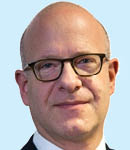NREI recently interviewed Joel Moser, founder and CEO of New York City-based Aquamarine  Investment Partners. The global institutional investor and manager of private equity targets equity investments in real assets in real estate, energy and infrastructure in the U.S. The company recently launched its first fund with the $1 billion North American Real Asset Fund I. Moser shares his insights on the fund’s investment strategy, as well as offering his views on the current climate for raising and placing capital.
Investment Partners. The global institutional investor and manager of private equity targets equity investments in real assets in real estate, energy and infrastructure in the U.S. The company recently launched its first fund with the $1 billion North American Real Asset Fund I. Moser shares his insights on the fund’s investment strategy, as well as offering his views on the current climate for raising and placing capital.
NREI: When was Aquamarine Investment Partners founded?
Joel Moser: We founded in June 2014. So we are a new company. The group that is Aquamarine has been in business together for about five years.
NREI: When you were founded in June, did you hit the ground running with fundraising?
Joel Moser: We used the time in the beginning to do organizational documents and get all of our ducks in a row, and we hit the ground running with fundraising in September. We are already deploying capital into a project. By December 2014, we had already signed our anchor investment of $250 million and we just completed our first big investor road tour through most of March.
NREI: Is Fund I fully funded?
Joel Moser: We are signing the remaining subscriptions to our program now, and we expect to close this first fund to investors this summer. It is fair to say that we are now at about $450 million.
NREI: Your goal is $1 billion, correct?
Joel Moser: Our target for this first fund is $1 billion. I don’t know if we’ll come just shy of that, or if we will pass it. But that is a good working number where we expect to be.
NREI: There are a lot of private equity funds competing for investor dollars today. How would you describe the current climate for fundraising?
Joel Moser: It is a very competitive environment. But by the virtue of our background and the skill set that we bring and the way that we have crafted our fund and our program, we occupy a slightly less crowded space. We have designed for Fund I a very specific agenda. We are investing in real assets only in the continental United States in three asset classes: real estate, energy and infrastructure. There are some, but not that many, real asset funds of this nature. There are, obviously, many real estate funds that invest in real estate in many different ways and with many different strategies. And there are energy funds, and there are infrastructure funds. We are one of a short list of asset funds that look at assets in each of those three buckets, and we seek projects with investment characteristics that meet a very particular objective. We are a 10-year fund, and we are targeting returns that, while my advisors tell me not to throw any numbers, I will say fall somewhat north of infrastructure funds, but not quite as ambitious as traditional private equity funds.
NREI: So for each of those three buckets, what is your strategy in terms of what you want to buy?
Joel Moser: We like assets that exist astride more than one of those buckets. For example, we like real estate that is tied to core infrastructure, such as [properties] located near core transportation assets. We are looking for very prime real estate that has investment characteristics akin to infrastructure, but with returns superior to traditional infrastructure returns.
In the energy space, we like energy infrastructure. Again, we like assets that sit astride two of those asset classes, both energy and infrastructure. While there are certainly pure plays in each one of those asset classes, we like to see asset classes that could perform in at least two, if not more, of those buckets and carry multiple revenue streams and/or collateral classifications.
NREI: Do you have some specific examples of that investment strategy?
Joel Moser: We like intermodal assets, because we see a core infrastructure project that is linked to real estate. We like real estate that is around core transportation or a transportation-oriented development, or pure real estate where its economic driver is its proximity to major transportation arteries. That could be something as remote as real estate around a suburban transportation hub, or it could be real estate in the core of Midtown Manhattan, near Grand Central Station where you see proximity to the major suburban transportation links driving incremental value.
NREI: Any examples specific to energy?
Joel Moser: In the energy space we are not pure energy investors. We are not investing in exploration or production, but we know energy well and we like it as an asset class. So we like energy infrastructure. One example would be a trans-shipment hub in an energy region that would have real estate characteristics and infrastructure characteristics, but the overall economic driver of activity is the energy industry.
NREI: What are some of the key geographic markets you are targeting?
Joel Moser: We like ports, and we definitely like the unconventional energy regions, such as North Dakota. North Dakota is having a bit of a down cycle right now because of the drop in the price of oil, but we are confident about the long-term health of the unconventional energy industry and are very much looking at potential investments around that industry.
NREI: Can you share any details on acquisitions you have completed?
Joel Moser: We have committed capital to our first deal early in a new real estate development in Manhattan. I can’t tell you the name of it yet, but it is going to be a very exciting new project. It has a little bit of development risk, but it is a project that we love and we’re very excited to be a part of it.
We are currently looking at three or four more projects. We are doing due diligence on a transportation asset, as well as a water infrastructure asset. We also are looking at existing housing stock in metropolitan regions that have some rent-regulated units, and we are looking at new developments of affordable housing for which some of the drivers are federal, state and local assistance programs.
NREI: How much total capital have you committed at this point?
Joel Moser: The first asset that we committed to was the Manhattan project with a $50 million (equity) commitment. The programs that we are looking at now are roughly $100 million per asset.
NREI: Are you focused more on new development, or are you looking to buy existing properties or redevelopment opportunities?
Joel Moser: We don’t have an official policy on that. We will certainly be happy to buy an existing asset. But generally speaking, I think we will probably bring more value to projects that are either greenfield to develop or existing projects that require some reconfiguration, because we’re comfortable with those kinds of challenges.
I have worked with construction risk for three decades, and it is risk that we understand how to hedge and invest into. With development, whether it is new development or reconfiguration, there is an opportunity for greater capital appreciation, value realization. So we probably will do more projects in the greenfield or in the rehab/repositioning space rather than the pure acquisition of existing, seasoned assets.
NREI: Aside from energy markets, are there other key geographic markets that you are focused on?
Joel Moser: For real estate we definitely like the core markets. I am somewhat of a New York chauvinist. For real estate, certainly for this first fund, we will not get much past the borders of New York City. We are focused mostly on Manhattan, and we may get over to Brooklyn and Queens and the Bronx on the margins. That is consistent with our investors’ focus. When we move over to the energy and infrastructure areas, of course we will look at a broader geographic area, essentially anywhere in the continental United States.
Nothing against Alaska or Hawaii, but with only $1 billion to invest, I think we will find plenty in the continental United States. Beyond Fund I, we already see a broader horizon. We are a very global team, and we expect that by Fund II we probably will be looking at cross-border transactions anywhere in the world.
NREI: So are you already planning the timing of your second fund?
Joel Moser: It depends on how fast we are able to deploy the capital from Fund I. But it could be as soon as 2016 that we are gearing up for the next fund, at least on a preliminary basis.
NREI: How competitive are you finding it on the investment side to place that capital?
Joel Moser: There is a lot of capital chasing deals for sure. My own personal background is practicing as a transactional energy infrastructure lawyer for 30 years. With that background, one of our points of distinction is that we are not afraid of complexity. So we will probably be looking at a transaction that has great economic drivers, but may require a little more thought and sensitivity that a pure equity investor may not want to spend the energy on. We will work through the complexity to find quality investments.

